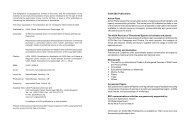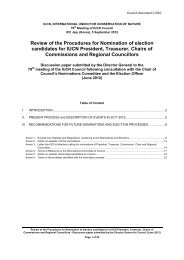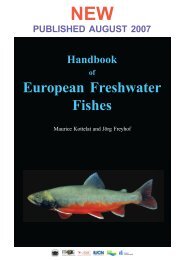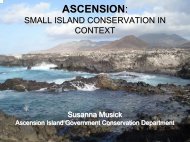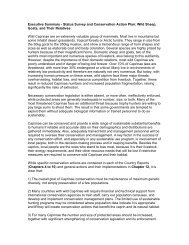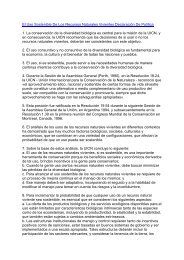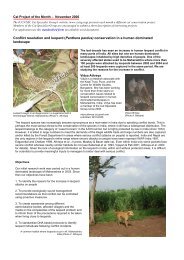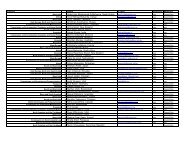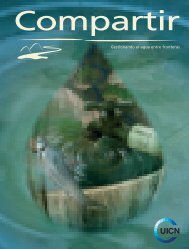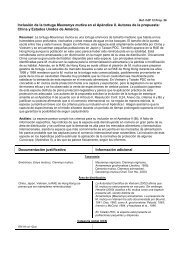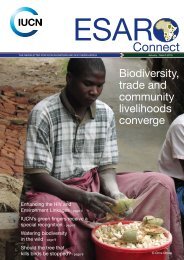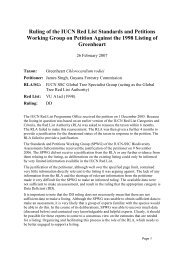Urban issues through environmental <strong>education</strong>Action Feedback ResultsWorking out different models <strong>for</strong>collection, transport and disposal/utilisation of solid wasteSetting up a number of pilot projectsin different parts of <strong>the</strong> cityEstablishment of citizens’ <strong>for</strong>umsFeedback from citizens’ <strong>for</strong>ums,associations and organisationsworkingwith street children,ragpickers, etc.Establishment of regular systemA standardised system whichof collection in categoriesis suitable <strong>for</strong> that locality iscarried out and followed up bycitizens’ associationsEstablishment of large composting Feedback from city corporationsites with <strong>the</strong> help of City Corporation workers and officials on viability Modified system of collecting<strong>for</strong> composting of waste from vegetable and feasibility of this system segregated waste from houses,and fruit marketshops, restaurants, schools andofficesa) Collecting recyclable materialfrom door <strong>to</strong> doorb) Avoiding health problems related Feedback from waste retrievers<strong>to</strong> picking from garbage bins(ragpickers) on <strong>the</strong>ir role in thisc) Composting organic matter systemd) VermicompostingEducational campaigns in schools andcolleges and neighbourhoods <strong>for</strong>motivating children, teachers, youthand <strong>the</strong> general community <strong>to</strong> take upaction programmes regarding wastesegregation, composting and recyclingin <strong>the</strong>ir localitiesDistribution of <strong>education</strong>al materialssuch as posters, pamphlets, films,articles <strong>to</strong> voluntary organisationsand individualsSensitisation of radio, television ando<strong>the</strong>r media organisations <strong>to</strong> take up<strong>education</strong>al programmes andcampaignsFeedback from <strong>the</strong> communityabout <strong>the</strong> difficulties <strong>the</strong>y faceregarding segregation of waste andhanding over <strong>to</strong> waste retrieversFeedback from volunteercommunica<strong>to</strong>rs and <strong>the</strong> public oneffectiveness of <strong>education</strong>almaterial and methodsEstablishment of composting pits Feedback from teachers and Schools and <strong>education</strong>al institutionsin schools, collection of recyclable children on <strong>education</strong>al materials include training about wastematerials, crafts and models from waste and <strong>the</strong> problems in segregating behaviour in <strong>the</strong>ir co-curricularmaterial and workshops on recycling and composting and extra-curricular activitiespaper, composting, etc.and <strong>for</strong>mulate different actionprogrammes <strong>for</strong> <strong>the</strong>ir lacalitiesModified <strong>education</strong>al materialsand methods63
<strong>Planning</strong> <strong>education</strong> <strong>to</strong> <strong>care</strong> <strong>for</strong> <strong>the</strong> <strong>earth</strong>public, and provide insights <strong>for</strong> <strong>the</strong> improvement of <strong>the</strong> system). Secondly,<strong>the</strong> volunteer communica<strong>to</strong>rs, teachers and school children were expected <strong>to</strong>comment on <strong>the</strong> effectiveness or o<strong>the</strong>rwise of <strong>education</strong>al materials andcampaign methods. Finally, <strong>the</strong> rag pickers and <strong>the</strong> public at large had viewson <strong>the</strong> feasibility of <strong>the</strong> system. Youth clubs, associations, <strong>education</strong>alinstitutions, citizens’ <strong>for</strong>ums and <strong>the</strong> ragpickers’ associations, groupsworking with street children etc. were all in a position <strong>to</strong> make valuablesuggestions.The feedback was interpreted <strong>to</strong> make improvements in <strong>the</strong> systems ofcollection and disposal and <strong>the</strong> pickup of recyclable matter from houses,shops etc., and <strong>to</strong> modify <strong>education</strong>al materials and methods.A feature of <strong>the</strong> strategy is that standardized systems suitable <strong>to</strong> a givenlocality should be established, carried out and followed up by citizens’associations. Schools and o<strong>the</strong>r <strong>education</strong>al institutions should includeteaching about waste in <strong>the</strong>ir curricula and in extra-curricular activities, and<strong>for</strong>mulate action programmes <strong>for</strong> <strong>the</strong>ir localities. In schools, <strong>the</strong> creation ofcomposting pits, <strong>the</strong> collection of recyclable materials, crafts and <strong>the</strong> makingof models using waste materials and workshops on recycling paper,composting etc. have been proposed.The programme counts on finding sponsors - <strong>the</strong> citizens <strong>the</strong>mselves, privateenterprise, or large service clubs - <strong>to</strong> procure basic but essential materialssuch as tricycles, buckets, drums, uni<strong>for</strong>ms, shovels, rakes, and gloves aswell as <strong>the</strong> means <strong>to</strong> construct composting pits.CEE South continues <strong>to</strong> persuade <strong>the</strong> BCC <strong>to</strong> create sanitary landfills <strong>for</strong> <strong>the</strong>safe disposal of <strong>to</strong>xic and soiled waste.“Clean Up Kodagu”The disposal of non-biodegradable waste in far-flung districts of Indiacreates a special problem. Urbanization in <strong>the</strong> rural areas has increasedconsumption and wastage, and plastic, glass and packaging materials arethrown out indiscriminately <strong>to</strong> lie in heaps on <strong>the</strong> roadside. Recycling andreprocessing industries are few and far between and waste pickers neglectsuch areas. The problem is particularly acute where <strong>the</strong> terrain is hilly,transport expensive and difficult <strong>to</strong> find.In <strong>the</strong> Coorg district of Karnataka, a “Clean Up Kodagu” Committee(Kodagu is <strong>the</strong> indigenous name <strong>for</strong> Coorg) was <strong>for</strong>med, and a strategyworked out <strong>to</strong> rid <strong>the</strong> district of non-biodegradable waste, by collection fromhomes, shops and o<strong>the</strong>r businesses. The District Commissioner, <strong>the</strong>Superintendent of Police, <strong>the</strong> Deputy Direc<strong>to</strong>r of Public Instruction (DDPI),<strong>the</strong> Deputy Conserva<strong>to</strong>r of Forests, and o<strong>the</strong>r officials and prominent citizens<strong>to</strong>ok part in <strong>the</strong> work of <strong>the</strong> committee.School children were asked <strong>to</strong> collect non-biodegradable waste at home and<strong>to</strong> bring it <strong>to</strong> school. Schools and teachers were asked by <strong>the</strong> DDPI <strong>to</strong>64



